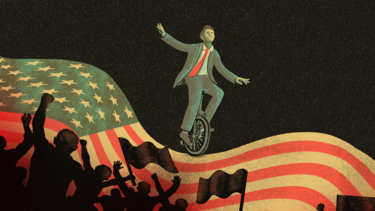Research
Can Mergers and Acquisitions Reduce Employee Misconduct?
New research co-authored by Prof. Heather Tookes looks at whether employee misconduct in the highly regulated investment advisory industry goes down after a merger, potentially making the combined company more valuable.

What Activists Want from Allies
In a new study, Yale SOM’s Michael Kraus and PhD graduate Jun Won Park found that activists working for social change value allies who are trustworthy and willing to defer to activists’ leadership.

Can Bias Be Eliminated from Algorithms?
The predictive software used to automate decision-making often discriminates against disadvantaged groups. A new approach devised by Soheil Ghili at Yale SOM and his colleagues could significantly reduce bias while still giving accurate results.

Are Leaders Rewarded for Taking Risks?
In a new study, Yale SOM’s Oriane Georgeac, Gerben van Kleef of the University of Amsterdam, and their co-authors find that in certain situations, risk-taking can strengthen a leader—but it can also backfire.

Lack of Access to Mental Health Treatment Reduces Lifetime Income
Prof. Barbara Biasi and her co-authors found that those who couldn’t access treatment for bipolar disorder paid a price over the course of their careers—suggesting that lack of access to care can worsen economic inequality.

How Awards for Evaluators Can Reduce Gender Bias
Tristan Botelho and his co-author found that once recognized with Yelp’s Elite label, reviewers demonstrate less gender bias in their reviews. Workplaces could achieve a similar effect by subjecting managers’ hiring and promotion decisions to stronger scrutiny.

How ‘Stablecoins’ Could Unleash Chaos
Dollar-pegged cryptocurrencies are rapidly proliferating. But without regulation, these so-called stablecoins pose serious risks to the U.S. financial system, argue Yale SOM’s Gary B. Gorton and his co-author.

Without a Local Newspaper, Americans Pay Less Attention to Local Politics
Prof. Michael Sinkinson and his co-authors look back at when television, not the internet, was the new technology chipping away at newspaper circulation. They find that when readership diminished, engagement with local politics did too.

Numbers, Not Narratives, Remedy Misperceptions of the Racial Wealth Gap
A series of studies co-authored by Yale SOM’s Michael Kraus have shown that Americans vastly underestimate the wealth gap facing Black Americans. The latest research shows that detailed data is more effective than personal narratives in improving their understanding.

Women Aren’t Promoted Because Managers Underestimate Their Potential
Why are fewer women promoted to senior positions than men? In a study of a retail chain, Prof. Kelly Shue and her co-authors found that women got higher performance ratings than men but were incorrectly judged as having less leadership potential.
